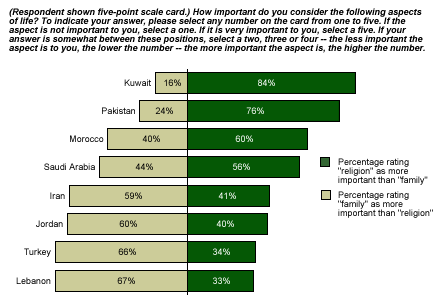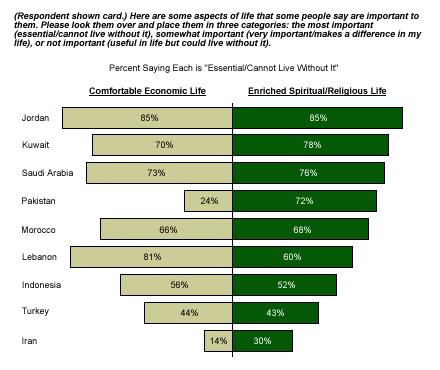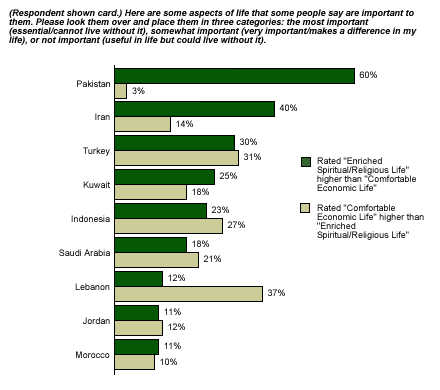A Gallup poll of nine predominantly Islamic countries finds that religion does not dominate residents' values in all countries measured. Indeed, in some of these countries there are large numbers of residents who value family and economic comfort more than religion. The countries in which religion is rated the highest are Pakistan and Kuwait, while the countries with the lowest ratings for religion among the nine surveyed are Lebanon and Turkey. In general, the more residents in these countries value religion, the lower their rating of the United States.
Religion vs. Family
Respondents were asked to rank order the importance of five items: 1) their own family/parents, 2) extended family or local community, 3) religion, 4) country, and 5) their own self. Typically, in the eight countries where this question was asked (Indonesia would not allow this question but did allow a different question that is analyzed later), "family" and "religion" ranked as the two highest items. While "country" typically followed "religion" and "family," "self" and "local community" vied for last place, among the sources of values residents said were most important to them.
The trade-off between family and religion provides some insight into the relative importance of the two. As shown in the following chart, the largest percentages rating religion as more important than family are found in Kuwait (84% religion, 16% family) and Pakistan (76% to 24%). Morocco (60% to 40%) and Saudi Arabia (56% to 44%) also show majorities of their residents favoring religion over family.

In the other four countries, at least about six in 10 residents said they favor family over religion: Iran (59% favoring family), Jordan (60%), Turkey (66%), and Lebanon (67%).
Religion vs. Economic Comfort
In a separate question, respondents were asked to rate the importance of several different aspects of life. The two that clearly stood out from among the others were "Having a comfortable economic life," and "Having an enriched religious/spiritual life."
As shown in the following graph, a majority of residents in seven of the nine countries say having an enriched spiritual or religious life is "essential" to them. Turkey (43%) and Iran (30%) show smaller numbers expressing that view. The graph also shows that majorities in six of the nine countries say having a comfortable economic life is "essential" to them. Turkey (44%), Pakistan (24%), and Iran (14%) all show smaller numbers with that opinion.

Upon examining the differences between the numbers who say religion is important and those who say a comfortable economic life is important, Pakistan stands out -- with religion dominating the responses by 72% to 24%. The second-largest difference is found in Iran, where there is a 16-point margin in favor of religion. In Lebanon, the only country in which there is a significant number of non-Muslims, there is a 21-point difference in the opposite direction: 81% of residents say a comfortable economic life is essential, compared with 60% who say that about an enriched spiritual life.
Another perspective is achieved by comparing the percentages of people in each country who rated religion higher, the percentage who rated a comfortable economic life higher, and the percentages who rated both items equally important.

As the graph reveals, 60% of Pakistanis rated the importance of religion higher than that of a comfortable economic life, the largest difference among all of the nine countries. Also, just 3% rated religion lower than a comfortable economic life, the smallest difference among the countries in the study. Another 37% of Pakistanis rated both items equally.
The second-largest margin in favor of religion was seen in Iran, where 40% rated the "religion" item more important, 14% the "economy" item. A margin of about the same size, though in the opposite direction, is found in Lebanon, where the "economy" item was rated more important by 37% and the "religion" by 12%, with 51% giving each item the same rating.
In the remaining countries, having an enriched religious life and a comfortable economic life are rated at about the same level of importance. In fact, in seven of the nine countries, at least half of the people say the two values are equal.
"Please see next week's Tuesday Briefing for a discussion of how respondents' views on religion affect their rating of the United States."
